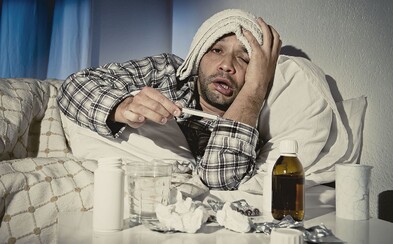 Ozempic can cause vision loss. A new study has shown a link between the drug and eye problems
Ozempic can cause vision loss. A new study has shown a link between the drug and eye problems
Ozempic can cause vision loss. A new study has shown a link between the drug and eye problems
Ozempic can cause vision loss. A new study has shown a link between the drug and eye problems
Vaginal Wetness Changes, Size Does Not. Not With the Number of Partners, Not With Childbirth. Disproving the Female Body Myths
Myths, that should no longer exist in the 21st century
If problems persis, please contact administrator.

How much or how easily the vagina gets wet during arousal changes over a lifetime. It differs during menopause, after childbirth or breastfeeding. It is also affected by various diseases, drug use and or the quality of the relationship itself. However, this is not unusual, and according to gynaecologist Mária Kubalová, doctors in the outpatient clinics encounter this regularly.
Article below looks at what to do, what lubricant can help (and what, on the contrary, can be counterproductive or harmful) and when should you go see a doctor. For more topics on health and sexuality, follow this section.
Complicated and flexible
Some jokes and beliefs should no longer exist in the 21st century. With access to scientific evidence and sufficient access to information, matters should be approached based on facts, not impressions. One example in dire need of the scientific approach would be sexist jokes about stretched vagina, the hallmark of a "loose" woman.
Number of lovers which bumps a woman up to the "loose" category is not precisely defined. But the remarks are aimed to act either as a deterrent towards women without sexual experience (protecting her, from being "destroyed"), or mockingly, towards those who are sexually active (implying, that a woman loses value as the number of her past lovers increases).
According to gynaecologist Mária Kubalová, this is but a myth. "I do not know where this myth comes from, but it is definitely not true. The width of a woman's vagina says nothing about how often she has sex or how many sexual partners she has had. Frequent intercourse nor a larger number of partners, stretches the vagina, " she stated for Refresher.
Gynaecologist Kamila Žižková confirmed and expanded on her claim, stating that professional studies have not confirmed a connection between age and the depth of the vagina. Atrophy (contraction or shrinkage) occurs due to hormones, and fat and collagen loss. Alternatively, the size of the vagina is also affected by childbirth, but not in the long term.
"The changes are not permanent, and if so, they are minimal. Studies have not confirmed the difference in vaginal depth between women who gave birth and those who did not. As a practicing gynecologist I can say, that looking at the vulva or vagina, we are not able to say unequivocally, whether a woman has given birth and how many times or whether she participates in extreme sexual practices in any way" Žižková told us. If experienced doctors can barely see the difference, it is hardly possible for a layman to know, whether a woman has ever had sex, or if so, how many times.
Some myths won't be dismantled with a statement from experts, as they are rooted in fundamental misunderstanding of how a woman's body works.
View this post on Instagram
Dry does not mean broken
Sometimes the vagina simply does not get wet enough for sexual activity to be comfortable and enjoyable. According to gynaecologist Kubalová, this is not a rare problem, she encounters this in her outpatient clinic. According to her, dryness in the vagina can be caused by a number of things. "One of the reasons may be, for example, insufficient foreplay, a feeling of discomfort, or a fear of communicating what I like and what I don't."
Dryness can also be caused by various health conditions. Lubrication changes with aging, during menopause, after childbirth or during breastfeeding. It is also affected by various conditions, such as diabetes, the use of certain drugs including hormonal contraception, and cancer treatment.
Gynaecologist Kamila Žižková says that up to every other woman after menopause experiences vaginal dryness. In addition, it can be affected by lack of sex, sexual abstinence or various inflammations in the body.
However, for most part, these are hormonal changes (since hormones are responsible for moisturising and the maintenance of a healthy environment), but Kubalová says, that the reasons are sometimes psychological like insufficient foreplay or stimulation, which does not bring the desired results. In addition, a woman may be dry, even if she feels excited.
That's when it's time to bring out the help: time, foreplay, good headspace and, let's be honest, lubricant.
View this post on Instagram
Dryness is a no-go
Vagina's wetness is maintained by the hormone estrogen, informs the international organisation Planned Parenthood, which focuses on education in the field of sexual and reproductive health. Fluctuations of this hormone directly affect the changes in the vagina. There are many reasons, like aforementioned menopause, pregnancy, treatment, or simply, the lack of excitement, affecting vaginal wetness. What helps with dryness depends on what causes it.
If it is a side effect of treatment, you need to talk to the doctor who prescribed it. When it comes to hormone levels, it is possible to use vaginal moisturisers or, in when it comes to more serious conditions, to address the cause itself. In any case, this problem falls into the hands of gynaecologists.
However, if it is not caused by a condition, you can reach for lubricants. According to this study from 2013, in over 90% of cases, the use of lubricant leads to better sex. Women also positively assessed lubricant during masturbation, the quality of which was also improved.
Doctor recommends especially those that are water-based - oil-based lubricants can damage the condom. "I would definitely avoid perfumed and flavored lubricants. It is also a good idea to read the ingredients and avoid substances that can damage the natural vaginal flora, disturb the pH and irritate the vaginal mucosa, or substances have been confirmed to be carcinogen."
Specifically, it is chlorhexidine gluconate, which kills lactobacilli that occur naturally in the vagina. Among parabens, methylparaben and propylparaben can be harmful, causing irritation or rash. "More seriously, however, they act as endocrine disruptors and can cause fertility problems," says the gynaecologist. Not all parabens are dangerous to fertility, those used in cosmetics are carefully regulated by the European Union.
View this post on Instagram
While you are reading the ingredients, the substances cyclomethicone, cyclopentasiloxane, cyclotetrasiloxane should also be avoided. "Silicone-based lubricants often contain these, but it they been found to cause uterine cancer in animals." However, according to available studies, they are safe in conventional cosmetics at controlled concentrations. In case the packaging indicates the pH of the lubricant, the doctor recommends choosing a product that maintains the naturally acidic pH of the vagina (values 3.8 to 4.5). "PHs above 4.5 are associated with bacterial vaginosis or yeast infections."
The absolute worst "lubricant" you can use is saliva. "As far as saliva is concerned, it is definitely unsuitable as a lubricant. We have a large number of bacteria in our mouths, that can disrupt the natural vaginal flora. Likewise, saliva after smoking, drinking wine or beer can lead to pH disturbance, damage the natural microflora, lead to yeast infection or irritation," states Dr. Kubalová for Refresher.
Dr. Žižková joines her warning, pointing out that baby oils, body lotions or butter are also unsuitable. On the contrary, coconut or almond oil is worth a try. "It doesn't make sense to wash lubricants after sex. The vagina has a self-cleaning ability and we could hurt yourself with vaginal lavage," she adds. Make sure you pay attention to the expiration date and to prevent urinary tract infections, it is generally recommended to urinate after sex.
If it doesn't go smoothly, there something is going on
"If a better and longer foreplay and psychological comfort, and sexual intercourse is unpleasant or painful, you should definitely seek a doctor," says gynecologist Mária Kubalová. Kamila Žižková adds that time to see a doctor comes, when dryness becomes subjectively annoying: that is, it prevents sexual intercourse, causes discomfort and is no longer a short-term or a one-off matter.
Sometimes sexual intercourse remains painful, practically impossible, despite efforts to improve the atmosphere or help each other with lubricants. This may be caused by a condition called vaginismus. Vaginismus is an involuntary contraction of the muscles around the vagina, which prevents penetration, explains Dr. Kubalová.
It is precisely in times, when vagina seems too narrow, or too tight during intimate moments, when this issue may be caused by vaginismus. "Violent penetration at that time can really hurt a woman not only physically but also emotionally," warns the doctor.
View this post on Instagram
One of the strange myths that still persists and is dangerous, is the idea that a tighter vagina is inherently better. However, if it is really noticeably narrow, something is probably wrong. "The average length of the vagina is about 10 cm. It is wider in the upper part (slightly over 3 cm), narrower in the lower part (about 2.5 cm),“ Dr. Kubalová told us. Naturally, anatomy varies person to person.
This is also the case with penises, so penetration can result in slight mismatching, but it is not as common as the lewd bar talk about a "small" or "big" vaginas suggests.
During sex or masturbation, a slight prolongation usually occurs. Insufficient relaxation and readiness can also be a sign that a person is not physically or mentally ready for intercourse. It is crucial to remain open and honest during the intimate moments, to ensure a relaxed atmosphere.
In any case, vaginas are very elastic, both doctors underscore. After all, they keep the tampon in place and at the same time, can birth a child (which is sometimes more than half a meter long). Over time, the signs of childbirth disappear completely, so it is fair to say, it is a pretty "magical" body part.
If problems persis, please contact administrator.













